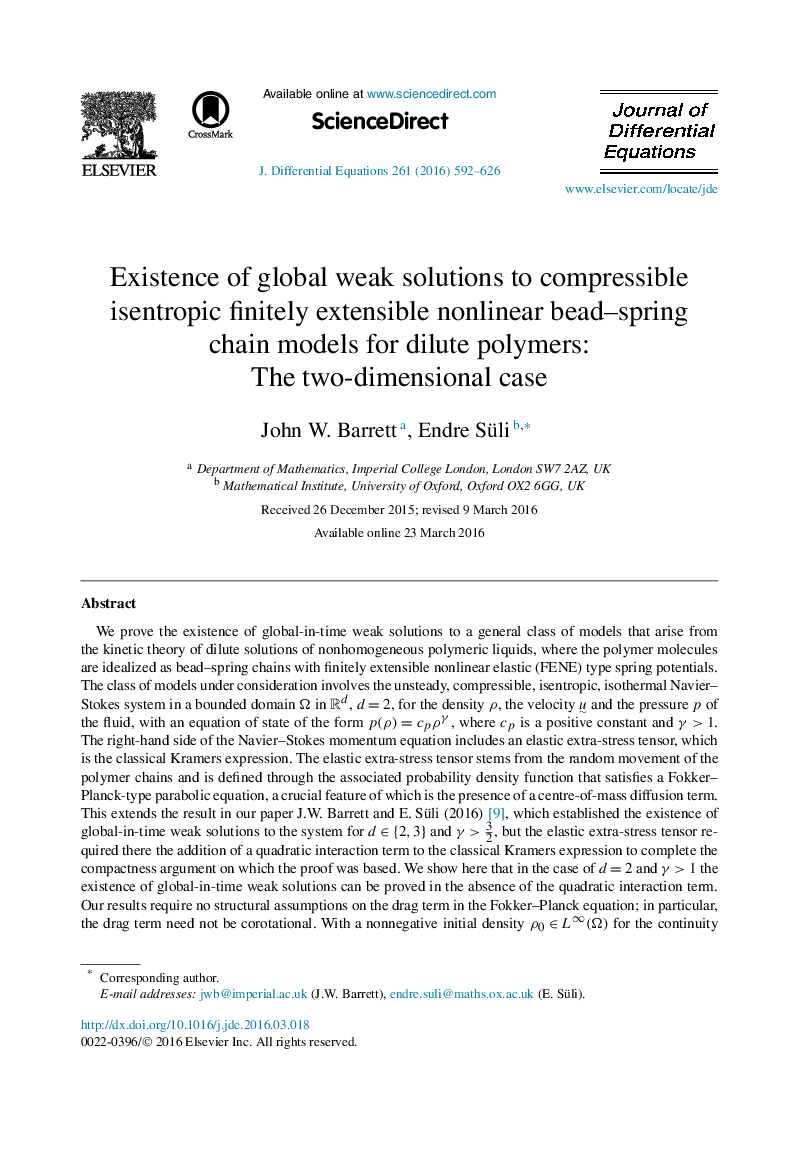| کد مقاله | کد نشریه | سال انتشار | مقاله انگلیسی | نسخه تمام متن |
|---|---|---|---|---|
| 4609312 | 1338505 | 2016 | 35 صفحه PDF | دانلود رایگان |
We prove the existence of global-in-time weak solutions to a general class of models that arise from the kinetic theory of dilute solutions of nonhomogeneous polymeric liquids, where the polymer molecules are idealized as bead–spring chains with finitely extensible nonlinear elastic (FENE) type spring potentials. The class of models under consideration involves the unsteady, compressible, isentropic, isothermal Navier–Stokes system in a bounded domain Ω in RdRd, d=2d=2, for the density ρ , the velocity u˜ and the pressure p of the fluid, with an equation of state of the form p(ρ)=cpργp(ρ)=cpργ, where cpcp is a positive constant and γ>1γ>1. The right-hand side of the Navier–Stokes momentum equation includes an elastic extra-stress tensor, which is the classical Kramers expression. The elastic extra-stress tensor stems from the random movement of the polymer chains and is defined through the associated probability density function that satisfies a Fokker–Planck-type parabolic equation, a crucial feature of which is the presence of a centre-of-mass diffusion term. This extends the result in our paper J.W. Barrett and E. Süli (2016) [9], which established the existence of global-in-time weak solutions to the system for d∈{2,3}d∈{2,3} and γ>32, but the elastic extra-stress tensor required there the addition of a quadratic interaction term to the classical Kramers expression to complete the compactness argument on which the proof was based. We show here that in the case of d=2d=2 and γ>1γ>1 the existence of global-in-time weak solutions can be proved in the absence of the quadratic interaction term. Our results require no structural assumptions on the drag term in the Fokker–Planck equation; in particular, the drag term need not be corotational. With a nonnegative initial density ρ0∈L∞(Ω)ρ0∈L∞(Ω) for the continuity equation; a square-integrable initial velocity datum u˜0 for the Navier–Stokes momentum equation; and a nonnegative initial probability density function ψ0ψ0 for the Fokker–Planck equation, which has finite relative entropy with respect to the Maxwellian M associated with the spring potential in the model, we prove, via a limiting procedure on a pressure regularization parameter, the existence of a global-in-time bounded-energy weak solution t↦(ρ(t),u˜(t),ψ(t)) to the coupled Navier–Stokes–Fokker–Planck system, satisfying the initial condition (ρ(0),u˜(0),ψ(0))=(ρ0,u˜0,ψ0).
Journal: Journal of Differential Equations - Volume 261, Issue 1, 5 July 2016, Pages 592–626
